
CINEMATIC ALLUSIONS TO LITERARY WORKS
DREAMCHILD (1985)
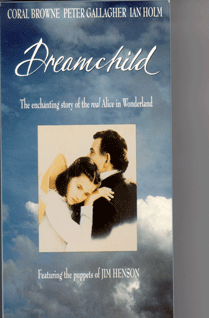
The plot of Dreamchild, although a biographical film, relies heavily on cinematic allusions to Lewis Carroll's Alice in Wonderland. The film concerns a visit to America in 1932 by an elderly Mrs. Alice Liddell Hargreaves, who was the inspiration of the Rev. Charles Dodgson aka Lewis Carroll's 'Alice.'
Filmmakers Gavin Millar and Dennis Potter, through the use of flashbacks and dreams of Mrs. Hargreaves, introduce the familiar characters and situations of Alice in Wonderland. However, Lewis Carroll's familiar words are given a different interpretation coming from a 79-year-old woman. The innocent word games and puzzles of Wonderland have a different and darker edge as the elder Alice approaches conversations she first encountered 70 years earlier. The Mad Hatter, March Hare and Caterpillar all continue to evoke bewilderment in Alice as she tries to analyze the relationship between herself and Rev. Dodgson.
Visually, the filmmakers, using Jim Henson's puppets, introduce us to Wonderland characters of the elder Alice's mind. Instead of the whimsical and beloved characters of John Tenniel's illustrations we are greeted by grotesque and menacing creatures-the dream of Wonderland becomes instead a nightmare.
A final interesting allusion found in Dreamchild is the use of the character of the Mock Turtle to attempt to explain the complex author. As Rev. Dodgson recites the 'Song of the Mock Turtle' in the film, the man is portrayed as ridiculous and as pathetic as the character he created. A critique of his obsession parallels the Gryphon's summation of the Mock Turtle, "It's all his fancy, that: he hasn't got no sorrow, you know."
A viewing of Dreamchild opens one to a reinterpretation of what Alice in Wonderland reveals about the author and his muse.
Robert Laurich
Associate Professor, Library
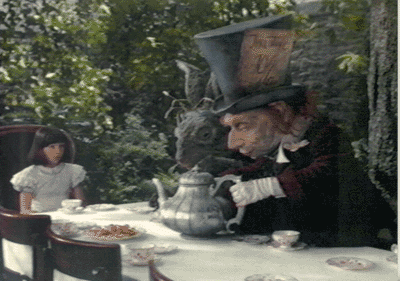 |
The March Hare and Mad Hatter in the elder Alice's (Coral Browne) mind are dark creations of Jim Hensen rather than the whimsical creations of John Tenniel's illustration. "Come, we shall have some fun now!" thought Alice. I'm glad they've begun asking riddles - I believe I can guess that," she added aloud. |
The John Tenniel illustration of the Mad Hatter's Tea Party. |
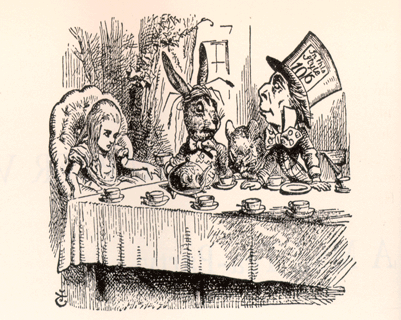 |
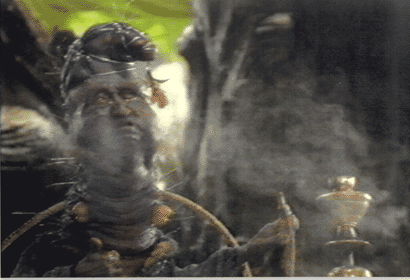 |
The adult Alice (Coral Browne) is confronted by the Caterpillar who once again asks, "Who are You?" "Who are You?" said the Caterpillar. This was not an encouraging opening for a conversation. Alice replied, rather shyly, "I-I hardly know, Sir, just at present - at least I know who I was when I got up this morning, but I think I must have been changed several times since then." |
The John Tenniel illustration of the Mock Turtle's oration. |
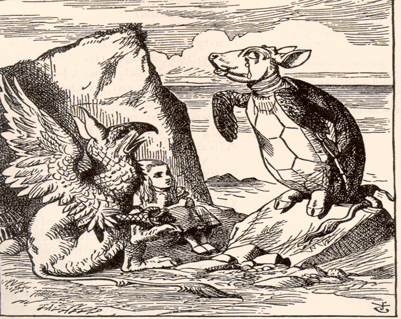 |
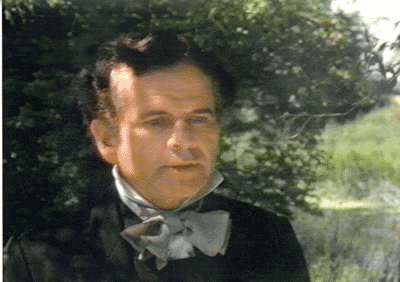 |
Lewis Carroll (Ian Holm) recites the Song of the Mock Turtle. "They had not gone far before they saw the Mock Turtle in the distance, sitting sad and lonely on a little ledge of rock, and, as they came near, Alice could hear him sighing as if his heart would break. She pitied him deeply. "What is his sorrow?" she asked the Gryphon. And the Gryphon answered, very nearly in the same words as before, "It's all his fancy, that: he hasn't got no sorrow, you know. Come on!" |
Bibliography
Base, Ron. "Peering into Dark Side of Alice's Looking Glass." The Toronto Star 13 Dec. 1985: D7.
Carroll, Lewis. The Annotated Alice: Alice's Adventures in Wonderland & Through the Looking Glass. New York: Bramhall House, 1960.
Holden, Stephen. "'Dreamchild.' About Lewis Carroll's Alice." The New York Times 4 Oct. 1985: C9.
Kempley, Rita. "'Dreamchild': Old Alice, New Wonderland." The Washington Post 17 Jan. 1986: 23.
| Previous Movie | Return to main page | Next Movie |
Copyright © The City College Library www1.ccny.cuny.edu/library |
||